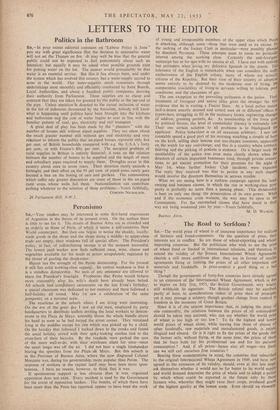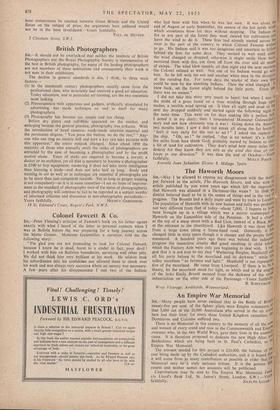• The Road to Serfdom ?
S1R,—The world price of wheat is of immense importance for millions of farmers and bread-consumers. On the question of price, their interests are in conflict. So are those of wheat-exporting and wheat' importing countries. But the politicians who wish to see the price of wheat fixed or limited in international relations, and therefore la extend the validity of the present International Wheat Agreement, cherish a still more ambitious plan: they are in favour of similar agreements fixing or limiting the prices of all other important raw materials and foodstuffs. Is price-control a good thing or a bad thing ? Though the governments of forty-five countries have already agreed to an extension of the International Wheat Agreement, which is due to expire on July 31st, 1953, the' British Government, very wiselY, still withholds its signature. The British refusal may be ascribed, partly at least, to considerations rather of price than of principle; yet it may presage a salutary though gradual change from control to freedom in the economy of Great Britain. Since it is of the utmost importance that, in judging the price of one commodity, the relations between the prices of all commodities.
should be taken into account, who can say whether the world pries of wheat is too high or too low ? To fix the highest and lowest world prices of wheat alone, while leaving free those of almost all
other foodstuffs, raw materials and manufactured goods, is unjust, illogical and absurd. Or is it right to fix the prices of the goods that the farmer sells, without fixing, at the same time, the prices of thoss, that he buys both for his professional use and for his personal consumption ? And, if all prices—hence also all wages—are fixed, can we still call ourselves free countries ? Bearing these considerations in mind, the countries that subscribed to the original International Wheat Agreement in 1949, and have noW agreed to the extension of its validity, should, even at this late stags, ask themselves whether it would not .be far better to let world supPlY and world demand determine the price of wheat and to adopt a policy by which wheat could be exported in the .future only by those farmers who, wher&er they might raise .their crops, produced grains of the highest quality at the lowest costs. Even should an eleventh' hour compromise be reached between Great Britain and the United States on the subject of price, the arguments here adduced would not be in the least invalidated.—Yours faithfully, 5 Chesham Street, S.W.1.
PAUL DE HEVESY.



































 Previous page
Previous page